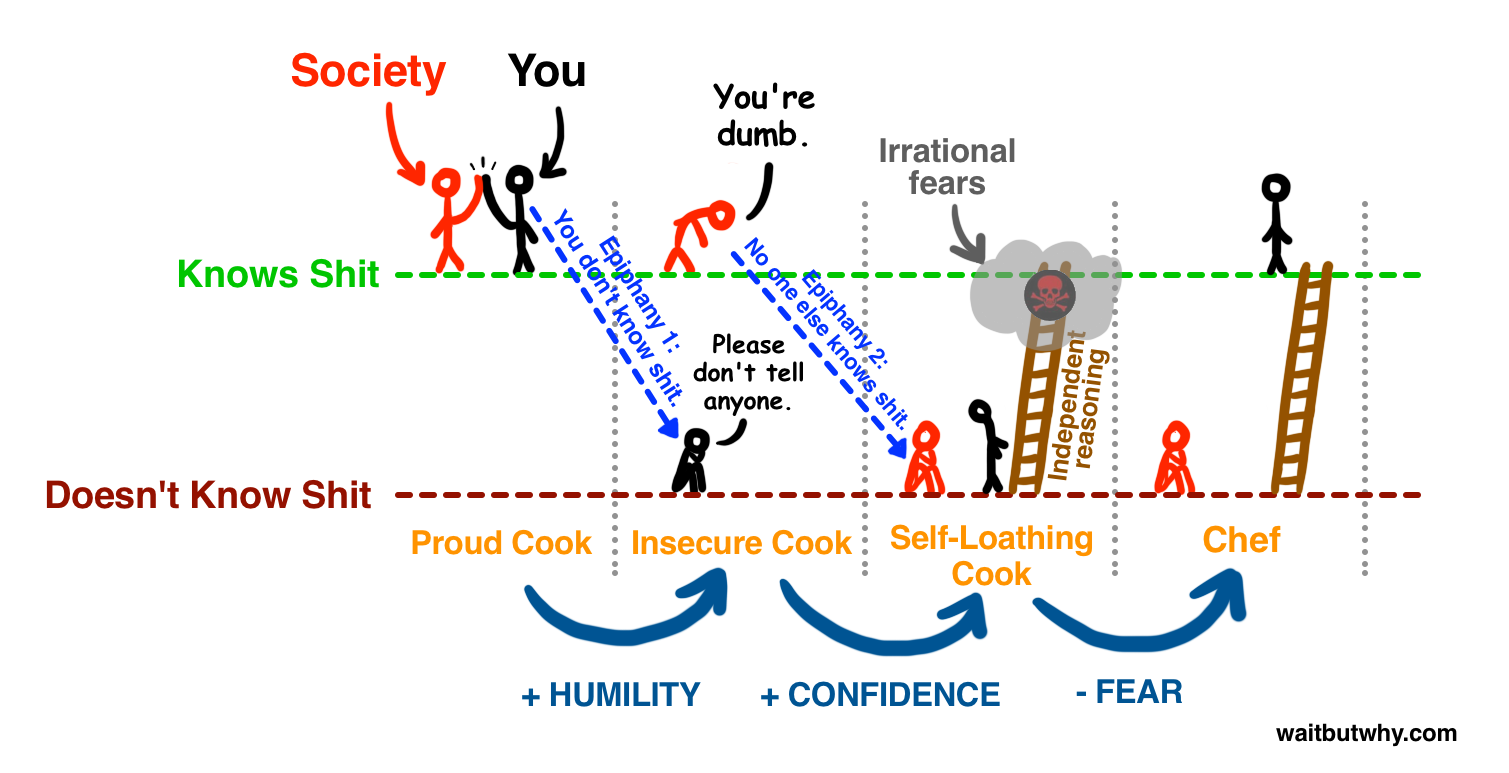The Cook and the Chef
Musk’s “secret sauce" by Tim Urban
Why some people seem like they are insanely efficient? What's the difference between them and the rest of us? Those are the questions Tim is looking for an answer by examining how Elon Musk functions.
(this is an excerpt of the above article, here and there with little additions)
Science
"The systematic study of the structure and behavior of the physical and natural world through observation, experimentation, and the testing of theories against the evidence obtained."
I met people before who seemingly "do not believe in science". What they usually mean is that
- They do not understand the definition above
- They do not trust other humans, or trust the wrong humans
- They are not able to differentiate between reliable and trash sources of information
- There are some personal identity issues that prevent them to move on from a belief that they integrated, blocking their understanding
- They can not deal with being wrong.
Generally it creates this deep urge in me to understand what they mean and how they went off-track. Turns out I am not the only one.
How did this work in the past for humans?
Tim believes it has to do with how blind faith operates in us. Back in the days there were two groups: theologians and scientists.
Christian thinkers took an old book as the source of facts, written by other deity humans, treated as unquestionable facts, not assuming that they could be wrong. The Earth was officially less than 6,000 years old, so if radiometric dating showed otherwise, it was a flawed technique, period. They were the Flood geologists.
Meanwhile scientists did not have the same limitation, and could go further as they kept gathering evidence, proving again and again, that the Earth is older than that.
It turns out when it comes to most of the way we think, the way we make decisions, and the way we live our lives, we’re much more like the flood geologists than the science geologists.
What does Elon do differently?
MuskSpeak: language that describes everyday parts of life as exactly what they actually, literally are.
Humans are computers: high level data processors, for better or worse.
A computer’s software is defined as “the programs and other operating information used by a computer.”
For a human, that’s what they know and how they think—their belief systems, thought patterns, and reasoning methods. Life is a flood of incoming data of all kinds that enter the brain through our senses, and it’s the software that assesses and filters all that input, processes and organizes it, and ultimately uses it to generate the key output—a decision.
People usually blame very successful people to have better hardware, while Tim is convinced that it’s their software, not their natural-born intelligence or talents, that makes them so rare and so effective.
Elon's Software
Wants: you want A to be B. You use your power to change whatever you can in order to achieve that goal.
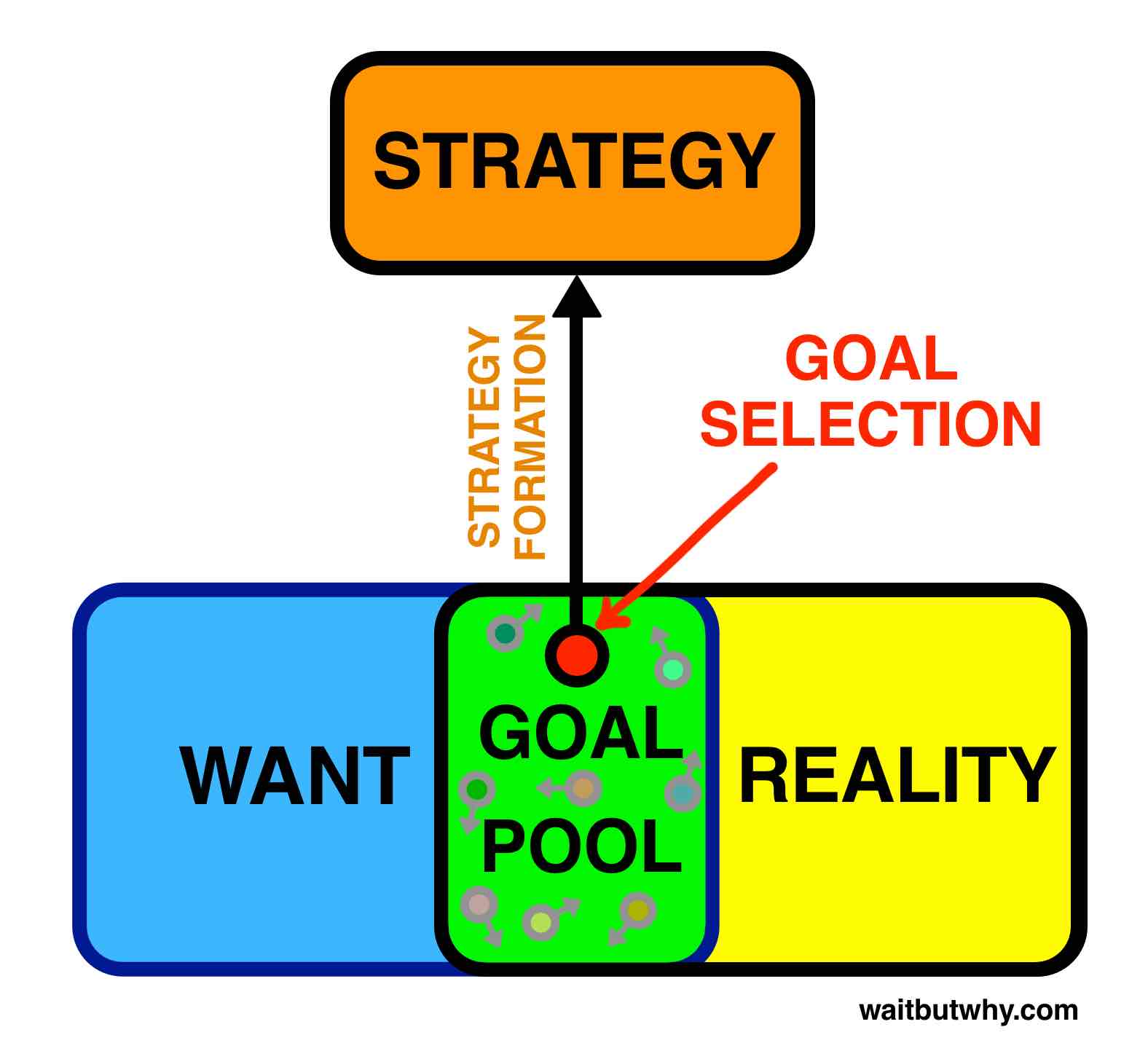
What most of us are missing: “reasoning from first principles”
People’s thinking process is too bound by convention or analogy to prior experiences. It’s rare that people try to think of something on a first principles basis. They’ll say, “We’ll do that because it’s always been done that way.” Or they’ll not do it because “Well, nobody’s ever done that, so it must not be good.” But that’s just an ineffective way to think. You have to build up the reasoning from the ground up—“from the first principles” is the phrase that’s used in physics. You look at the fundamentals and construct your reasoning from that, and then you see if you have a conclusion that works or doesn’t work, and it may or may not be different from what people have done in the past.
- Filling in the Want box from first principles requires a deep, honest, and independent understanding of yourself.
- Filling in the Reality box requires the clearest possible picture of the actual facts of both the world and your own abilities.
- The Goal Pool should double as a Goal Selection Laboratory that contains tools for intelligently measuring and weighing options.
- Strategies should be formed based on what you know, not on what is typically done.
Science doesn’t have axioms or proofs, for good reason
We keep iterating: Newtonian physics -> general relativity -> quantum mechanics. None are axioms. All are "zoomed in" compared to the other. Calling the Earth flat, or saying that it's 6000 years old is an axiom, therefore it's wrong. We see our environment, then create hypothesis, then find evidence whether it's likely to be true.
When we create axioms, what happens is that we fix our minds on a thing, because that makes us feel secure, instead of continuously re-adjusting the whole chain of what we know. We identify with those thoughts, build our entire character around that, and use all kinds of cognitive biases to justify what we think, while reality passes by.
In math:
Given: A = B
Given: B = C + D
Therefore: A = C + D
In Science:
Given (for now): A = B
Given (for now): B = C + D
Therefore (for now): A = C + D
In our lives, the only true axiom is “I exist.” Beyond that, nothing is for sure. And for most things in life, we can’t even build a real scientific theory because life doesn’t tend to have exact measurements.
Usually, the best we can do is a strong hunch based on what data we have. And in science, a hunch is called a hypothesis. Which works like this:
Given (it seems, based on what I know): A = B
Given (it seems, based on what I know): B = C + D
Therefore (it seems, based on what I know): A = C + D
Hypotheses are built to be tested. Testing a hypothesis can disprove it or strengthen it, and if it passes enough tests, it can be upgraded to a theory.
Most people instead of continuously testing the chains of reasoning, get stuck because it feels safe.
Musk builds his conclusions from first principles then tests the shit out of them, continually, and adjusts them regularly based on what he learns.
In reality: this is true for any given moments, however the content of the Want and Reality box (therefore the goal pool) continuously changes:
- Wants change as you shift priorities and what's important
- Reality box changes as you learn a new skill, learn that something is much easier than you thought, or that something else you thought is easy is virtually impossible as you dive in, as time advances, things become trivial that were impossible before
- Also, anything in there is just a hypothesis, not facts!
- Filling and keeping the reality box up to date is a huge, continuous endeavor
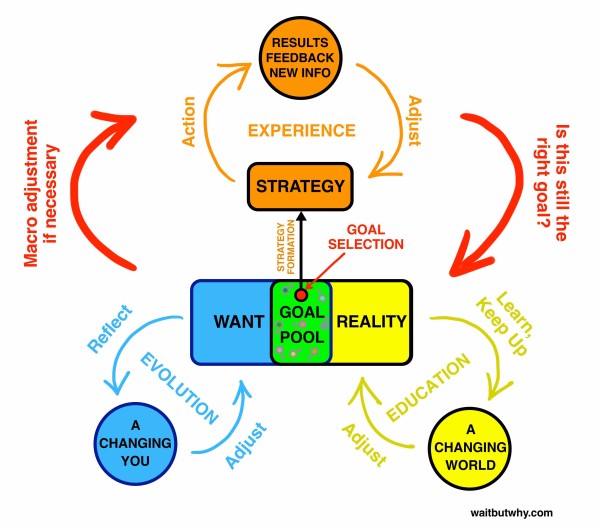
Your boxes are just your assumptions on the circles that represent the hypothetical real you - at any given moment - and the real world - at any given moment.
This is an ideal system, where everything is derived from first principles.
Musk described his early motivations from first principles:
- make sure humanity can sustain knowledge
What matters is knowledge in a human context. What I’m trying to ensure is that knowledge in a human context is still possible in the future.
- make sure "that there is a garden where flowers can bloom"
- Scientists have engineering limit, as engineering provides the data for science, let's go to study that
- He did PhD in physics in '95, but then the internet exploded.
- Against Conventional Wisdom: "you need a career and it's always better to have an academic qualification than not"
- Zip2 company, walked away with $22M 4 years later
- Against Conventional Wisdom: "it's nice and all, most people just lay back now and drink mojitos on a beach for the rest of their life, not risk all their fortune on something new"
- 1999 X.com: later 2002 PayPal, walked out with $180M
- Against Conventional Wisdom: "who would store money on the internet? Naah."
- Then, he started SpaceX
- Against Conventional Wisdom: "rocket science is difficult so that only the most qualified NASA people can do it"
Your entire life runs on the software in your head—why wouldn’t you obsess over optimizing it?
And yet, not only do most of us not obsess over our own software—most of us don’t even understand our own software, how it works, or why it works that way.
Why are we not effective?
Young people's brain are like clay: soft when born, then it hardens up. Learning SKILLS becomes harder and harder.
"My grandmother has been using a computer as long as I have, but I use mine comfortably and easily because my malleable childhood brain easily wrapped itself around basic computer skills, while she has the same face on when she uses her computer that my tortoise does when I put him on top of a glass table and he thinks he’s inexplicably hovering two feet above the ground. She’ll use a computer when she needs to, but it’s not her friend."
How do the formative years look like for most?
Parents to kids:
I’m an adult so I know much more about this than you, it’s not up for debate, don’t argue, just obey.
That’s when the cliché “Why?” game comes in (what MuskSpeak calls “the chained why”).
A child's brain wants to understand what's happening why. And to understand something, you have to have a sense of how that thing was built. When parents and teachers tell a kid to do XYZ and to simply obey, it’s like installing a piece of already-designed software in the kid’s head. When kids ask Why? and then Why? and then Why?, they’re trying to deconstruct that software to see how it was built—to get down to the first principles underneath so they can weigh how much they should actually care about what the adults seem so insistent upon.
Soon, the parent gets tired and cuts it off:
Because I said so
How would this work in science?
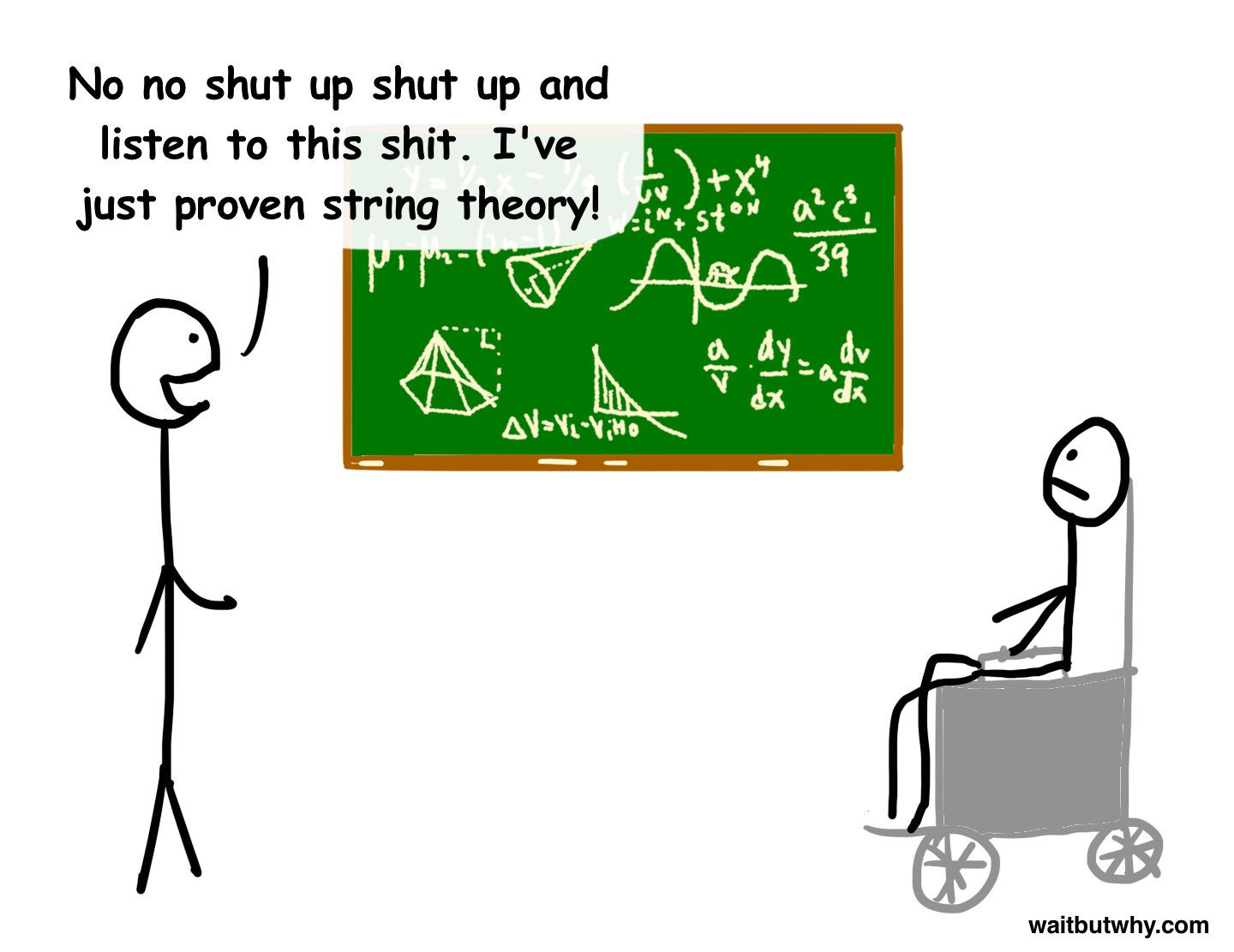
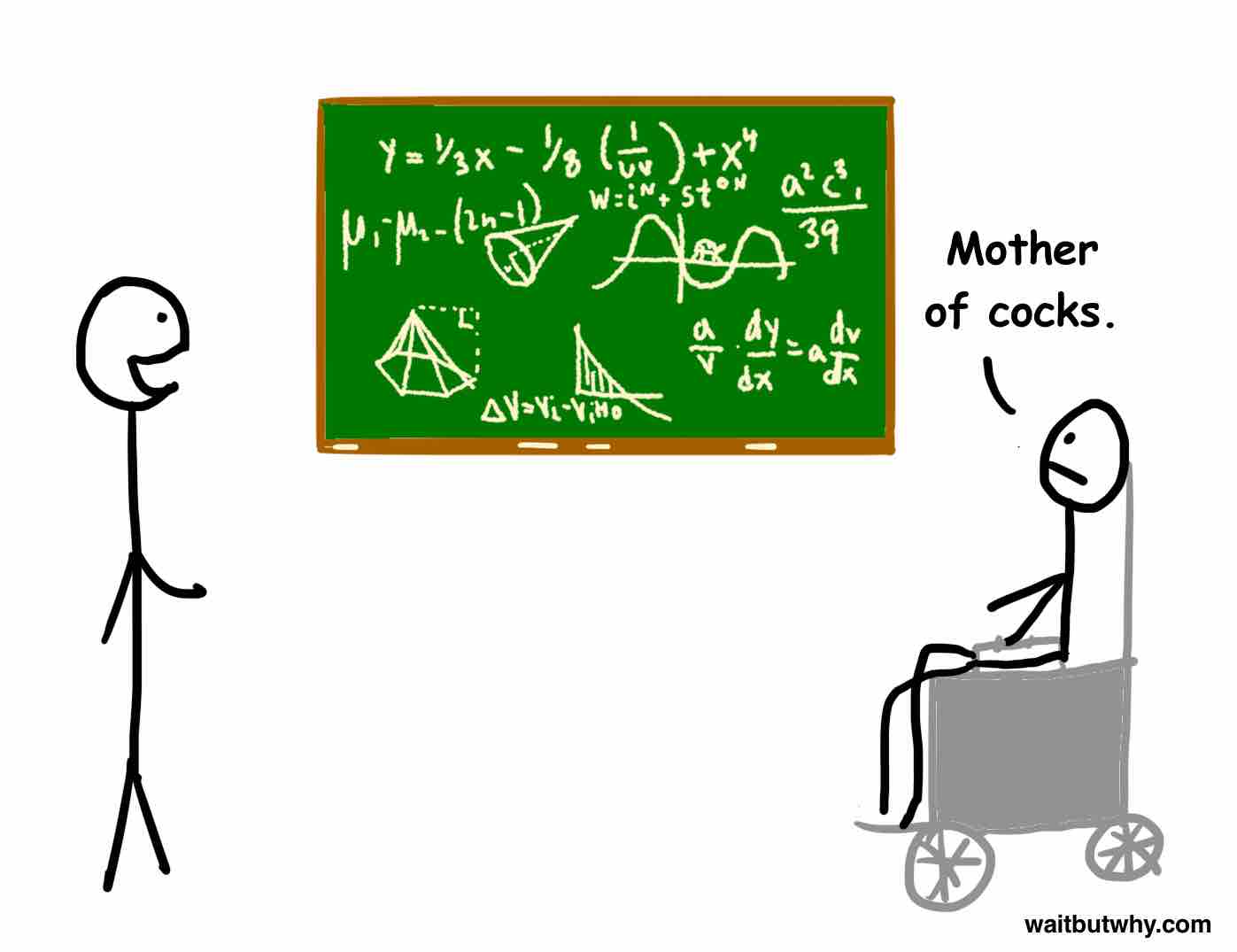
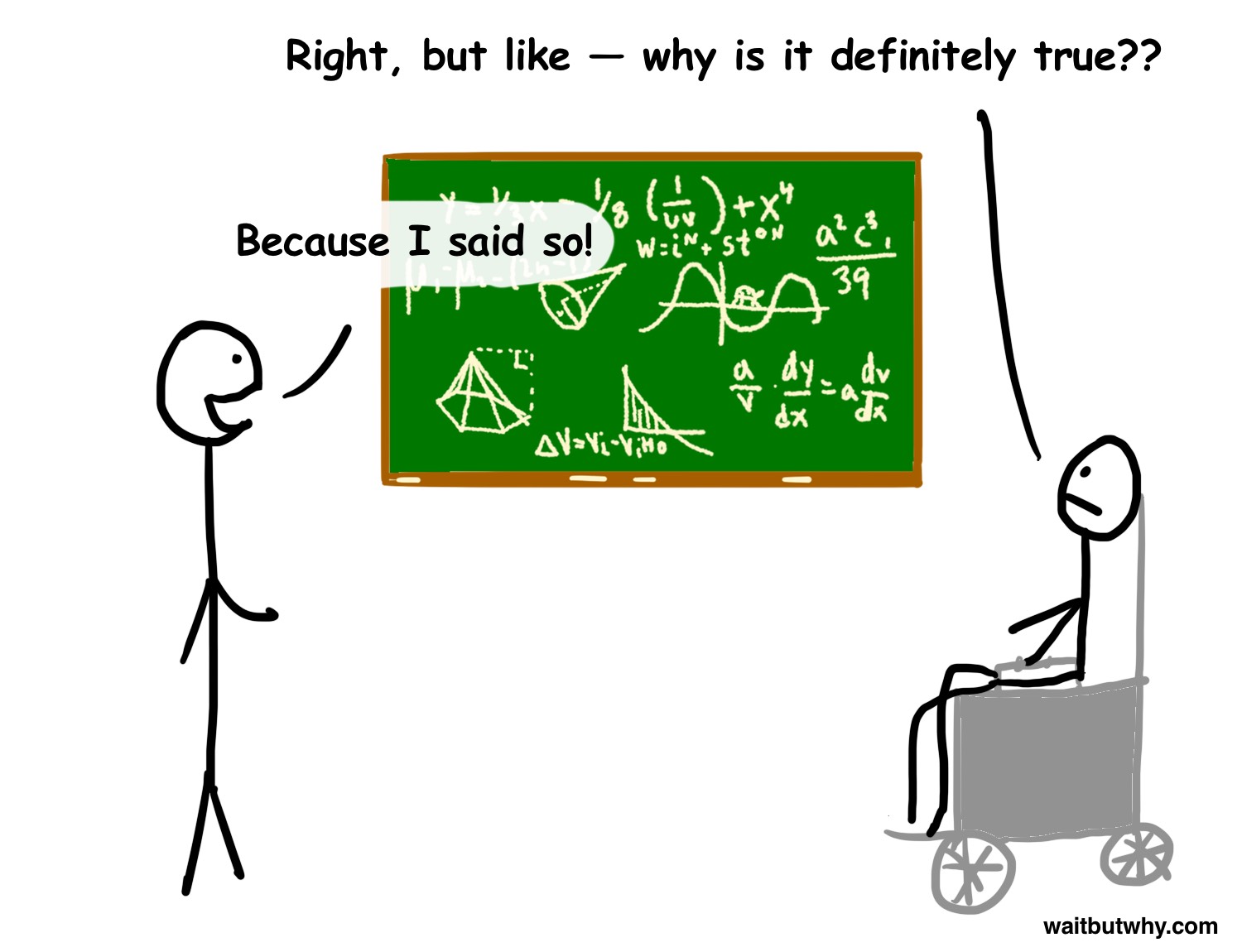
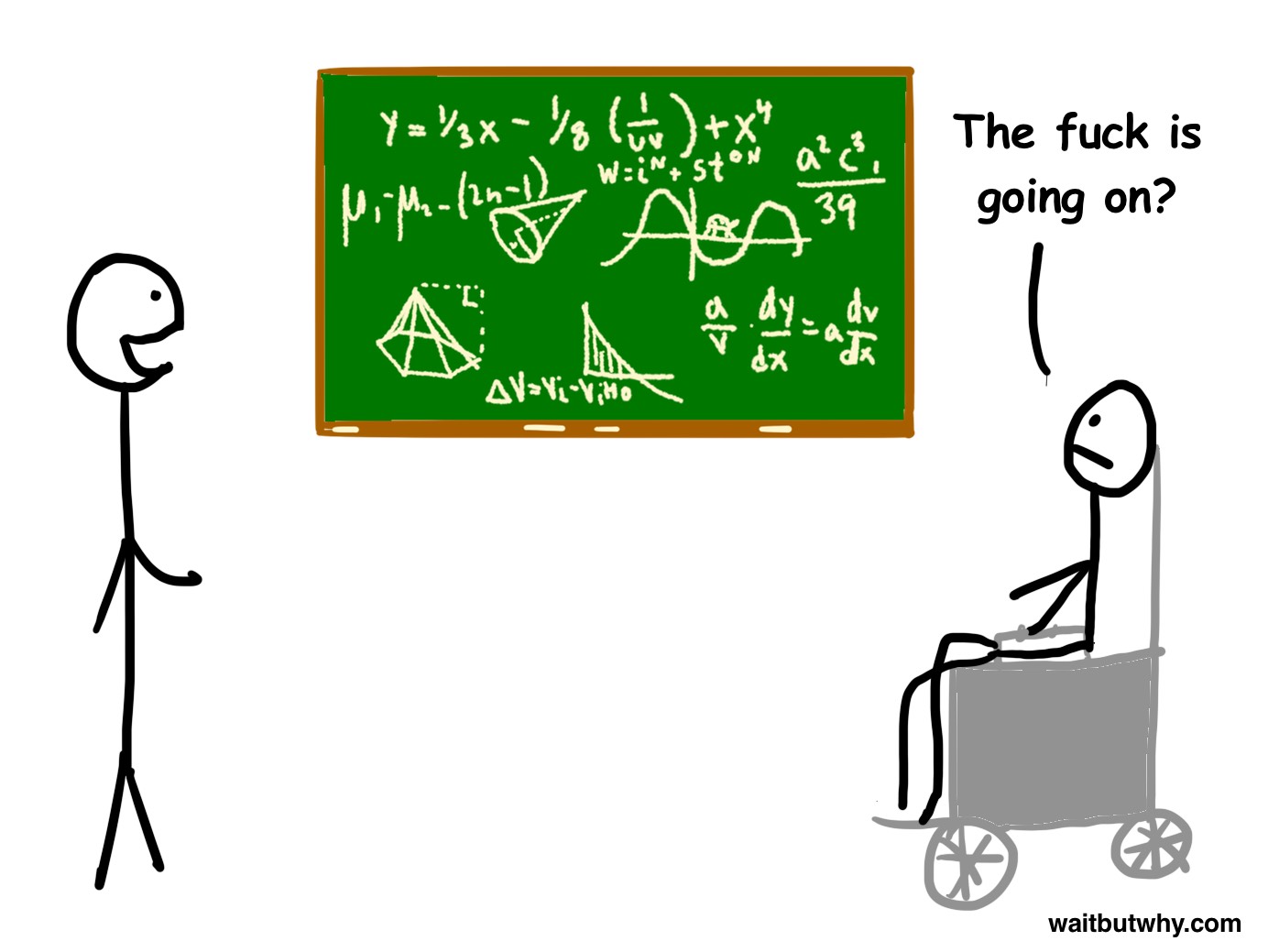
Most kids meet these floors, early on. We get cut off. Instead of teaching how to dig, we get ready answers.
Ranting about Factory Worker Education System - by Seth Godin, more on creative thinking by James Clear
In the 1960s, a creative performance researcher named George Land conducted a study of 1,600 five-year-olds and 98 percent of the children scored in the “highly creative” range. Dr. Land re-tested each subject during five year increments. When the same children were 10-years-old, only 30 percent scored in the highly creative range. This number dropped to 12 percent by age 15 and just 2 percent by age 25. As the children grew into adults they effectively had the creativity trained out of them. In the words of Dr. Land, “non-creative behavior is learned.”
People think of creativity as a natural born talent, but it’s actually much more of a way of thinking—it’s the thinking version of painting onto a blank canvas. But to do that requires brain software that’s skilled and practiced at coming up with new things, and school trains us on the exact opposite concept
During our brain’s most malleable years, parents, teachers, and society end up putting our clay in a mold and squeezing it tightly into a preset shape.
Seeking the whys if you are an adult, many times you end up with "because my mom/dad said so".
We propagate fears and indoctrination though multiple generations.
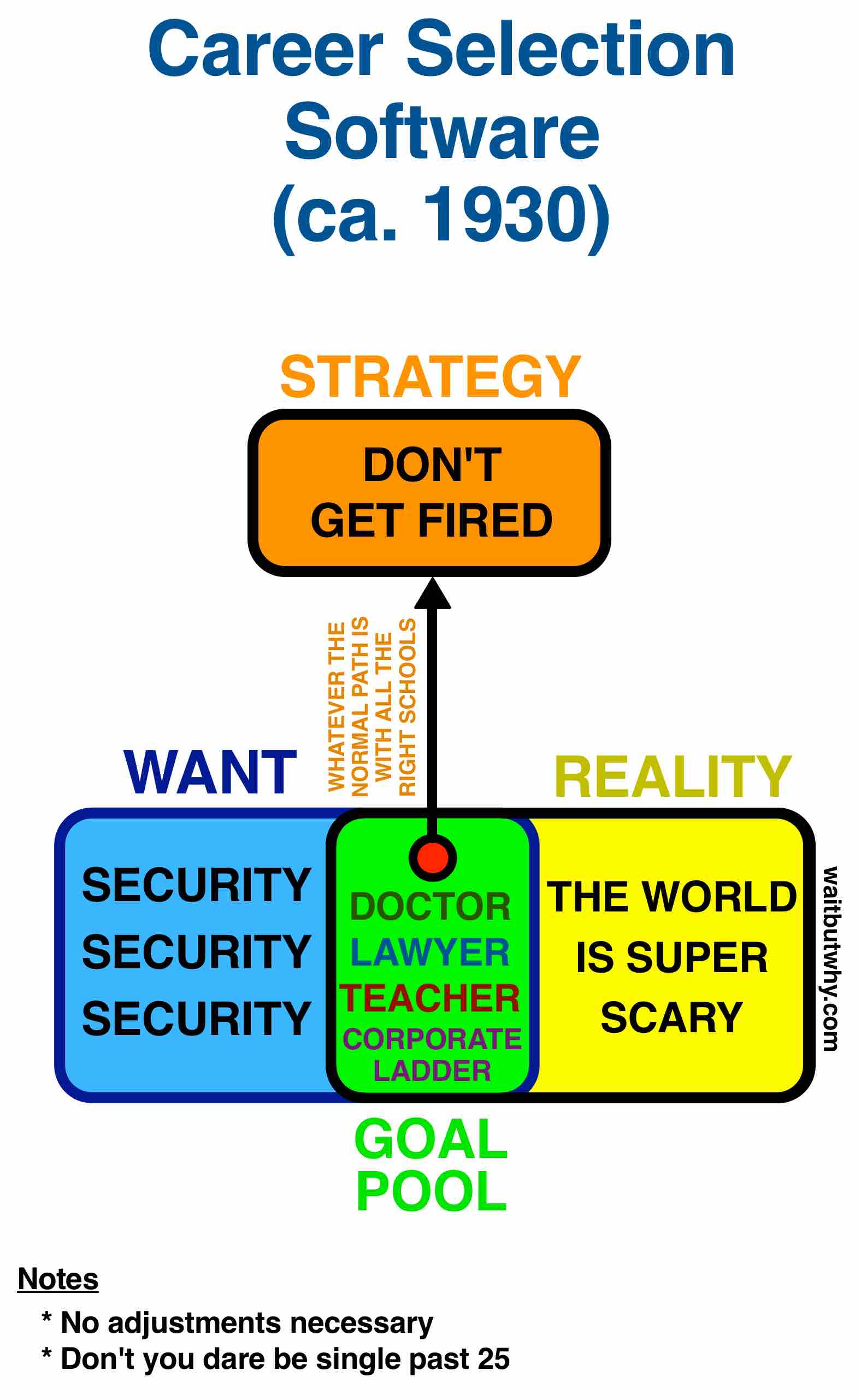
Dogma
When convictions are not based on actual data.
"X It's true because [authority] says so."
Dogma is not software to be coded—it’s a printed rulebook.
“Because I said so,” and you absorb the implicit message “Your own reasoning capability is shit, don’t even try, just follow these rules so you don’t fuck your life up,” you grow up with little confidence in your own reasoning process.
When you’re never forced to build your own reasoning pathways, you’re able to skip the hard process of digging deep to discover your own values and the sometimes painful experience of testing those values in the real world and learning you want to adjust them—and so you grow up a total reasoning amateur.
Only strong reasoning skills can carve a unique life path, and without them, dogma will quickly have you living someone else’s life.
When you don’t know how to reason, you don’t know how to evolve or adapt.
How did this happen?
Tribalism
People like us do stuff like this.
Conscious tribalism is when someone's independent identity and the tribe's values happened to be the same. When the member do not have independent capacity to reason, it becomes blind tribalism follower, without it's own values and standards.
Einstein: Few people are capable of expressing with equanimity opinions which differ from the prejudices of their social environment. Most people are even incapable of forming such opinions.
Certain more dogmatic tribes tend to attract more blind tribe members.
Humans crave connection, security, self esteem, a sense of belonging, dogmatic tribes provide that. Us feels great. Identifying feels necessary.
Tribes:
Given (because the tribe says so): A = B
Given (because the tribe says so): B = C + D
Therefore, with certainty: A = C + D
Blind tribalism is comfortable but it comes at a price of being a sheep in a crowd, just to feed your feeling that you are belonging somewhere. An ego-trip, that may be very harmful to others and oneself.
The cook and the Chef
It's a scale on how well can you apply your knowledge in a certain topic. There is a gradient between cooks who work from recipes though chefs who know and understand the underlying connections and can create something new from scratch.
Reasoning and the depths of the Why game takes effort. On our daily lives, its easier to create routines and best practices.
But when some new situation is to be solved, you can either create or copy. A chef has the routine of exploring the problem, gather the data test run solutions, iterate.
A recipe following cook looks for a recipe that's close enough and he trusts. A proper authority covers the areas of life with pre-existing recipes so they do not have to come up with a new one. If there is no one, they just look for another authority that has one. Friends, conventional wisdom, religion. Once "researched" -> good enough, just follow.
Conventional Wisdom Rules for starting a business:
1.- if something has been done, it's possible
2.- if something has not been done, it's not possible
3.- if something is both a good idea and possible, it's already been done.
That's reasoning by analogy.
Being a chef isn’t being like Elon Musk—it’s being yourself
Goose's Intermezzo For a long time, I'd create an ego game out of creating something "original". Fighting for appreciation is the wrong motive most of the time. It's like "because authority says that's how I define my self worth".
That's a huge blocker. The point is to carve out your own way, dive into the thing you actually like doing instead of trying to copy other's goals.
Looking at others can be part of the learning process but only as long as it's not just copying.
The difference between copy-pasting an answer from Stackoverflow and just getting the hint from there and actually being able to apply the idea to your specific problem. It's not wrong looking at others, as long as you know what you're doing.
That's a very important part of learning and I should not not use this as an excuse for not diving into something. The Simpsons have done it anyways.
Just get better at learning. The more stuff I learn to apply, the more likely I'll be able to create in a certain field.
In order to create something original, I have to let go of my ego and keep on learning new skills, so maybe one day, what I create, will qualify as something unique.
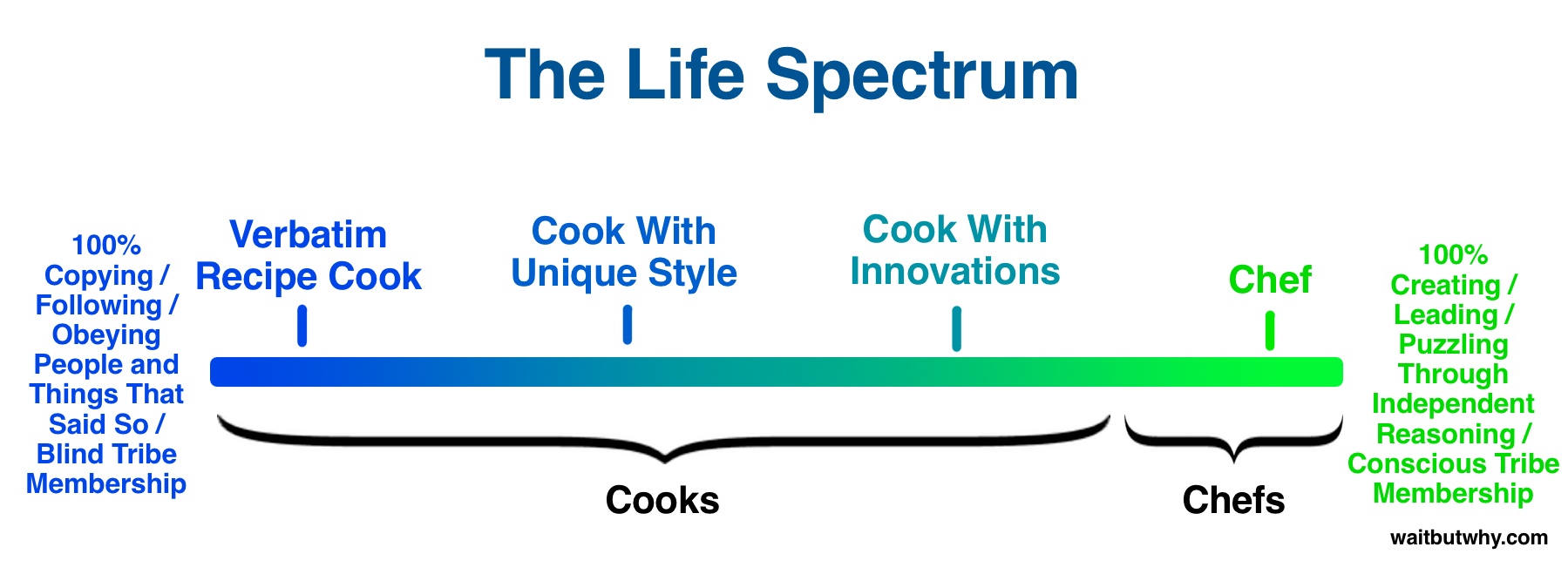
Most of us thinks we're more on the right side of the slide, because we count achieved goals and initiatives we've taken. That's being a chef looking cook in a certain community. All the achievements you are making, your environment already laid out for you. The reason you picked those goals is because you are part of that tribe. Zoomed into the fog (another great article by Tim).
The problem is hype. We do not even get that there is a "brain software", we think these people have "special hardware". We mistake:
- clear vision for magic, while they only have a more up-to-date reality box.
- They process the relevant, up-to-date, trusted sources of information
- accurate understanding for risk taking and courage
- while it seems they're making risky decisions, they're actually seeing the more precise model of reality
- originality for brilliant ingenuity
- outside of the box is more about independence than intelligence
- see Apple's iPhone: not "how did they do it before", or "how to make a better keyboard" it was "let's make a proper phone"
Why Elon Musks are so rare?
1. Which tribes survived?
In 50,000 BC, tribes full of independent thinkers probably suffered from having too many chefs in the kitchen, which would lead to too many arguments and factions within the tribe. A tribe with a strong leader at the top and the rest of the members simply following the leader would fare better. So those types of tribes passed on their genes more than other tribes. And now we’re the collective descendants of the more cook-like people.
2. Personal survival
Human self-preservation never depended upon independent thinking—it rode on fitting in with the tribe. (One can map reality around better if they get kicked out of the tribe, they die - independently of their wisdom)
3. Today is not normal
We’re living in the anomaly, when for many of the world’s people, survival is easy. The problem is, most of our heads are still running on some version of the 50,000-year-old survival software. Our fears block us in unreasonable ways.
How to get out?
In order to improve the way we make decisions, we need to realize a series of things as follows:
1. You do not know shit
Being victims of any dogma, the flood geologists were victims of their own certainty. Without certainty, dogma has no power. And when data is required in order to believe something, false dogma has no legs to stand on. It wasn’t the church dogma that hindered the flood geologists, it was the church mentality of faith-based certainty.
Stephen Hawking meant when he said, “The greatest enemy of knowledge is not ignorance, it is the illusion of knowledge.”
Which parts of our thinking are currently sitting in church?
METHOD: How to figure out your reasoning capacity on a certain topic?
Beat arrogance. Find unjustified certainty. Integrate humility. Play the WHY game:
-
Revert back to our four-year-old selves and start deconstructing our software by resuming the Why game our parents and teachers shut down decades ago.
-
With each of these questions, the challenge is to keep asking why until you hit the floor—and the floor is what will tell you whether you’re in a church or a lab for that particular part of your life.
LAB: If a floor you hit is one or more first principles that represent the truth of reality or your inner self and the logic going upwards stays accurate to that foundation, you’re in the lab.
CHURCH: If a Why? pathway hits a floor called “Because [authority] said so”—if you go down and down and realize at the bottom that the whole thing is just because you’re taking your parent’s or friend’s or religion’s or society’s word for it—then you’re in church there.
The thing you really want to look closely for is unjustified certainty.
And if thinking about all of that ends with you drowning in some combination of self-doubt, self-loathing, and identity crisis, that’s perfect. This first epiphany is about humility. Humility is by definition a starting point—and it sends you off on a journey from there. The arrogance of certainty is both a starting point and an ending point—no journeys needed. That’s why it’s so important that we begin with “I don’t know shit.” That’s when we know we’re in the lab.
One false assumption on the chain can get you down to a path far away from a "less wrong" conclusion.
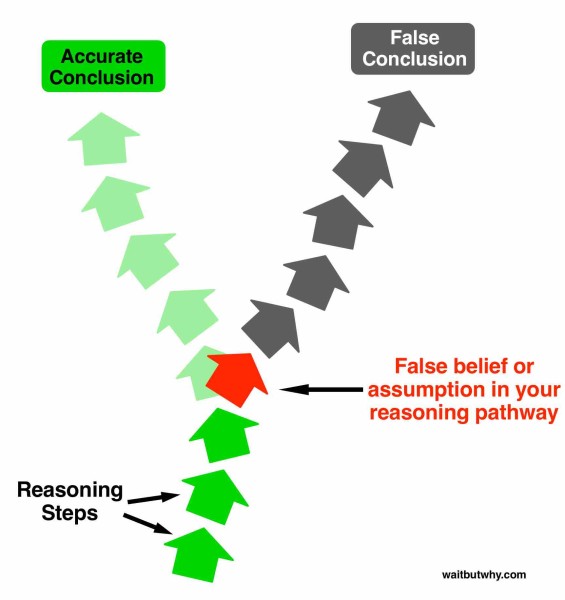
2. No one else knows shit either
Everything around you that you call life was made up by people that were no smarter than you.
When you grow up, you tend to get told the world is the way it is and your life is just to live your life inside the world. Try to have a nice family life, have fun, save a little money. Life can be much broader once you discover the above fact.
And you can change it, you can influence it, you can build your own things that other people can use. Once you learn that, you’ll never be the same again.
"Not respecting society is totally counterintuitive to what we’re taught when we grow up—but it makes perfect sense if you just look at what your eyes and experience tell you." - Steve Jobs
There are clues all around showing us that conventional wisdom doesn’t know shit. Conventional wisdom worships the status quo and always assumes that everything is the way it is for a good reason—and history is one long record of status quo dogma being proven wrong again and again, every time some chef comes around and changes things.
“In questions of science, the authority of a thousand is not worth the humble reasoning of a single individual." - Galileo
This second epiphany is about confidence—the confidence to emerge from that humility through a pathway built on first principles instead of by analogy. It’s a confidence that says, “I may not know much, but no one else does either, so I might as well be the most knowledgeable person on Earth.”
3. You’re playing Grand Theft Life
Once you're in the lab, and manage to distinguish between them on a topic, there are still powers that holds us back.
a. Misplaced Fear
Our obsession with fears of all shapes and sizes may have served us well in Ethiopia 50 000 years ago—but it mostly ruins our lives today.
The “better safe than sorry” philosophy—i.e. if there’s a chance that a certain fear might be based on real danger, file it away as a real fear, just in case, and even if you confirm later that a fear of yours has no basis, keep it with you, just in case.
Fear of Failure
Generally humans fear failure, but failure now means very different things than 50 000 years ago. Back then, fear meant that we die, and our genes will not be passed on. Nowadays fear means getting laid off or changing careers at worst.
We’re more afraid of public speaking than texting on the highway, more afraid of approaching an attractive stranger in a bar than marrying the wrong person, more afraid of not being able to afford the same lifestyle as our friends than spending 50 years in meaningless career—all because embarrassment, rejection, and not fitting in really sucked for hunters and gatherers.
Why is beating fear important?
The science approach is all about learning through testing hypotheses, and hypotheses are built to be disproven, which means that scientists learn through failure. Failure is a critical part of the process.
So many of the most wildly impactful people seem to treat the world like a lab and their life like an experiment session—that’s the best way to succeed at something.
b. Misplaced Identity
What you believe, what you stand for, and what you choose to do each day are conclusions that you’ve drawn. In some cases, very, very publicly.
As far as society is concerned, when you give something a try—on the values front, the fashion front, the religious front, the career front—you’ve branded yourself. And since people like to simplify people in order to make sense of things in their own head, the tribe around you reinforces your brand by putting you in a clearly-labeled, oversimplified box.
It becomes very painful to change.
You become attached to who you currently are and what you’re currently doing.
When you are the experiment, negative feedback isn’t a piece of new, helpful information—it’s an insult. And it hurts. And it makes you mad. And because changing feels impossible, there’s not much good that feedback can do anyway—it’s like giving parents negative feedback on the name of their one-month-old child.
As now you are the failure, not the things you do - it makes change hard if not impossible.
Aerospace industry, Musk said, “There’s a tremendous bias against taking risks. Everyone is trying to optimize their ass-covering.”
Ask yourself the question: “Am I trapped in my own history?”
Am I not taking risks, because I am too attached to certain comfort?
The challenge is to somehow figure out a way to lose respect for your own fear. Doing something out of your comfort zone and having it turn out okay is an incredibly powerful experience, one that changes you—and each time you have that kind of experience, it chips away at your respect for your brain’s ingrained, irrational fears.
Question to self: WHAT DO I FEAR?
GTA Analogy: you can pull anything as long as you can get away with it. Do not forget that in real life there are laws and jail, but other than that? Support you and your family's basic needs.
... and I and many more even have problems with that.
Conclusions
First accept: no-one is pure chef. Different day, different area, different people.
- remember that we have software, not just hardware.
- be humbler about what we know
- more confident about what’s possible
- less afraid of things that don’t matter.
- reasoning is a skill and like any skill, you get better at it if you work on it
- notice when you're in a church instead of a lab
Stages of understanding.
